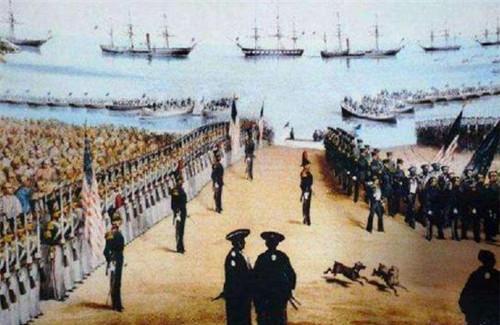As the saying goes, if you fall behind, you will be beaten. Due to Qianlong's closed-door policy during the Qing Dynasty, China missed the opportunity to develop the industrial revolution and capitalism, resulting in China's level of science and technology and productivity lagging behind that of Western countries by more than 200 years, and the final consequence was the humiliating history of the modern century.

Our neighbor, Japan, on the other hand, was much luckier, even though at the beginning of the 19th century they were as feudal empires as we are. Later, in 1853, U.S. Navy Commodore Perry and Zu Abbott led four steam fleets to Japanese territorial waters, wearing 63 cannons (known as the "Black Ship Incident"). Like the Qing government, Japan was threatened by the U.S. Navy to open treaty ports. However, the two sides discussed and replied after half a year, so the US military did not invade Japanese territory.
Surprisingly, at that time, Japan's inner court was also divided into open and conservative, but the conservatives invariably turned to the open, and eventually not only gave the United States most-favored-nation treatment, but also opened all the treaty ports, and in the end still avoided the risk of aggression. Of course, it also contributed to the emergence of the Meiji Restoration later.
It was precisely because in the second half of the 19th century, Japan actively caught up through the Meiji Restoration, and in just a few decades, they suddenly transformed from backward feudal countries into capitalist powers, and the rapid development caught the Qing court off guard at that time. As a result, there was a crushing defeat of the Qing court in the Sino-Japanese War of 1895.
However, Japan, which had been promoted to the nouveau riche of the great powers, did not stop its invasion of China, after all, the largest soft persimmon in all of East Asia was China at that time. In 1931, they launched the 918 Incident and marched into northeast China, slowly opening the prelude to the war of aggression against China.
At the beginning of the war of aggression against China, the Japanese army only dared to make waves in the northeast. But as their ambitions grew, they began to encroach on the central region of our country. The outbreak of the July 7 Incident in 1937 marked the beginning of the Japanese army's all-out invasion of China, and also meant the launch of the all-people War of Resistance, and countless Sons and Daughters of China began to resist and began to fight back with a steely will and a spirit of unwillingness to be enslaved.
On October 24, 1938, the Battle of Wuhan began. The Japanese army attacked Huangpi and directly approached Hankou, forming a three-sided corner of Wuhan on the east, north and south. Our army was defeated and was defeated and retreated. In order to publicize this victory, the Japanese army specially sent reporters accompanying the army to take photos of countless invaders flaunting their might.
In 1939, when our army withdrew from Wuhan, 6 hygienists accompanying the army were accidentally captured by the Japanese army, which was filmed by the Japanese military reporters at that time and also appeared on the front page of the newspaper at that time.
In line with the fierce and bloodthirsty nature of the Japanese invaders, these 6 hygienists must be fierce and less lucky, and it is not difficult to see in the photos that they are of similar age and look quite immature, and it is difficult to imagine how they will be destroyed by the Japanese army.
Fast forward 5 years, the situation in the War of Resistance Against Japan was extremely reversed, with the United States and Australia joining World War II, the Taiping Battlefield was opened, and the Japanese army began to be overwhelmed and gradually lost on the frontal battlefield.
On May 11, 1944, under the cover of the Allied air force, the Chinese Expeditionary Force launched a final onslaught on Tengchong, Yunnan, annihilating more than 6,000 Japanese troops in one fell swoop. In the process of rescuing prisoners of war, our expeditionary force took a photo, and surprisingly, the 6 female hygienists who were captured 5 years ago actually appeared in the photo.
Judging from the photos, the 6 female hygienists are very lonely and even a little sluggish, presumably they have experienced hellish inhuman treatment in the past 5 years. It was also with the support of firm faith that they were able to survive the day when the Japanese army was defeated.
However, at that time, only the photos were taken, and the identity of these 6 female hygienists was not known, presumably they also lived to the founding of New China. It has to be said that it is a miracle that the Japanese army base camp can survive for 5 years.
And their encounters also always remind every Chinese people that only by working hard to build the motherland and not letting the motherland lag behind the world can we have the courage not to be invaded by foreign nations. Although the history of humiliation in modern times has passed, the truth that "backwardness means being beaten" will never become obsolete.